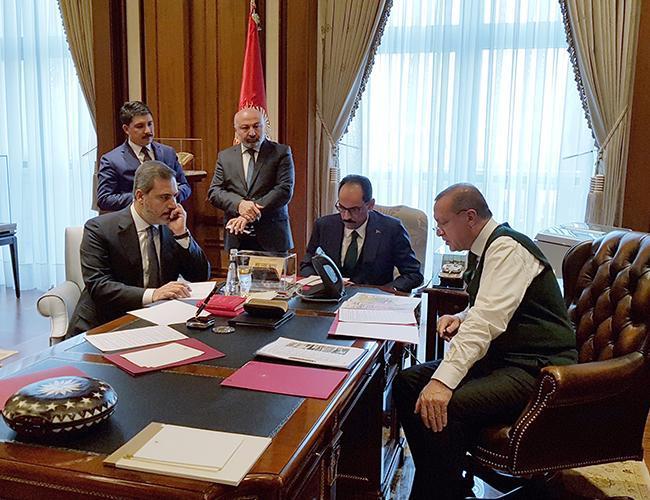
Turkish President Tayyip Erdoğan said on Nov. 28 that his talks with U.S. President Donald Trump last week were the first occasion in a long time that the two NATO allies were “on the same wavelength,” adding that they would speak again in the coming days.
His comments came after he spoke on the phone with his U.S. counterpart on Nov. 24.
Speaking to reporters in parliament following ruling the Justice and Development Party’s (AKP) group meeting, Erdoğan said Trump indicated that another call may happen this week. “If he doesn’t call, I will call,” he added.
Diplomatic ties between Ankara and Washington have been strained by several disagreements, particularly over the United States’ support for the People’s Protection Units (YPG), which Ankara regards as a terrorist group due to its links with the outlawed Kurdistan Workers’ Party (PKK).
“The telephone call we had with Trump on Friday [Nov. 24] was the first in a long time where we were both on the same wavelength,” Erdoğan said in his speech to AKP deputies in parliament.
He said discussions would continue in the coming days on the issues of the YPG, defense industry cooperation, and the fight against the network of the U.S.-based Fethullah Gülen, widely believed to have orchestrated Turkey’s July 2016 coup attempt.
Trump on Nov. 24 told Erdoğan that he had issued instructions that the U.S. would no longer provide weapons to the YPG, according to a statement after the conversation made by Turkish Foreign Minister Mevlüt Çavuşoğlu.
“President Trump has instructed [his generals] in a very open way that the YPG will no longer be given weapons. He openly said this absurdity should have ended much earlier,” Çavuşoğlu said after the telephone conversation.
However, the Pentagon said on Nov. 27 it was reviewing “adjustments” in arms for Syrian Kurdish forces but it stopped short of halting weapons transfers, adding that such decisions would be based on battlefield requirements.
“We are reviewing pending adjustments to the military support provided to our Kurdish partners in as much as the military requirements of our defeat-ISIS and stabilization efforts will allow to prevent ISIS from returning,” said Pentagon spokesman Eric Pahon, referring to the Islamic State of Iraq and the Levant (ISIL), which U.S.-backed forces are battling in Syria.
On Nov. 27, the White House also made a statement regarding the issue, saying the U.S. plans to reduce military support for groups fighting ISIL in Iraq and Syria but that does not mean Washington will stop all aid.
With ISIL’s territory shrinking, “we’re in a position to stop providing military equipment to certain groups but that doesn’t mean stopping all support of those individual groups,” White House spokeswoman Sarah Sanders said.
Turkey’s Presidential Spokesperson İbrahim Kalın said the Pentagon statement would be discussed at Turkey’s National Security Council (MGK) meeting later on Nov. 28, which was due to be chaired by Erdoğan.
On Nov. 27, during an interview with the BBC World in London, Turkish Prime Minister Binali Yıldırım said Trump recently told Erdoğan in clear terms that it is “wrong” to supply weapons to the YPG.
“Mr. Trump has understood what is important for Turkey,” Yıldırım said.
“They [the U.S.] said this [cooperation with YPG] is not a choice. This is a necessity. OK. We understand, although we do not accept. It is a temporary relation. Now, it is time to finish because Daesh is already defeated,” he added, using another acronym for ISIL.
“So, President Trump said it is wrong to provide weapons. This is clearly mentioned,” Yıldırım said.
Stating that Turkish policy on fighting against ISIL had been “clear” from the beginning, Yıldırım said it was important to “choose the right partner” to fight ISIL.
“You are not able to fight a terror organization using another terror organization,” he added.